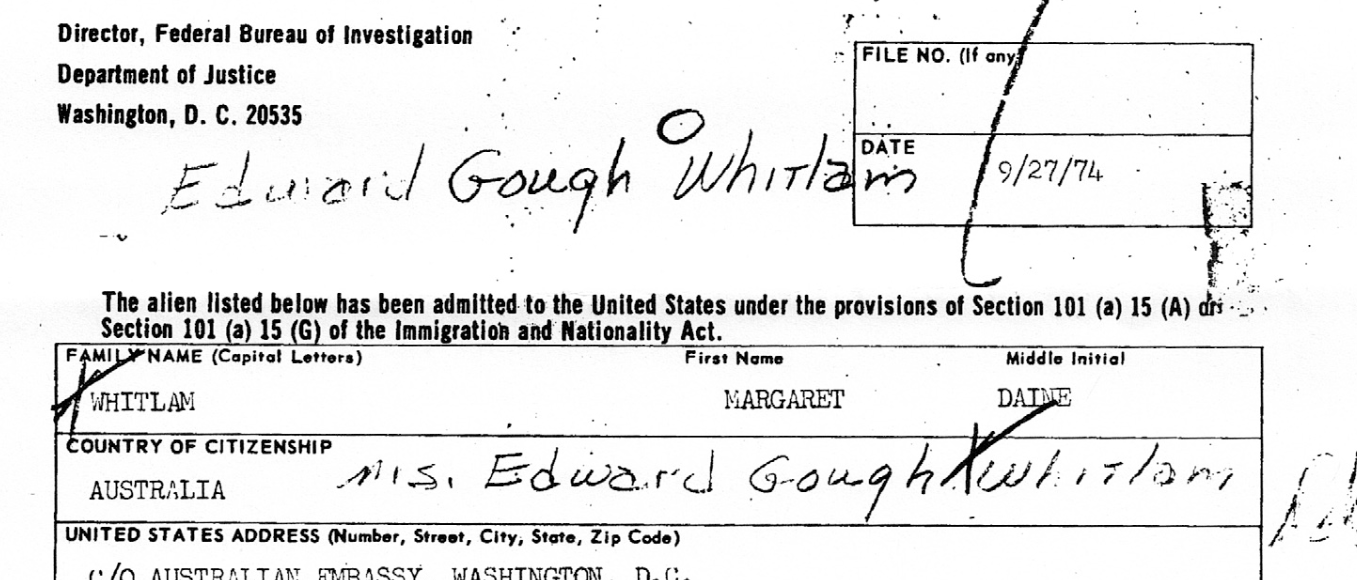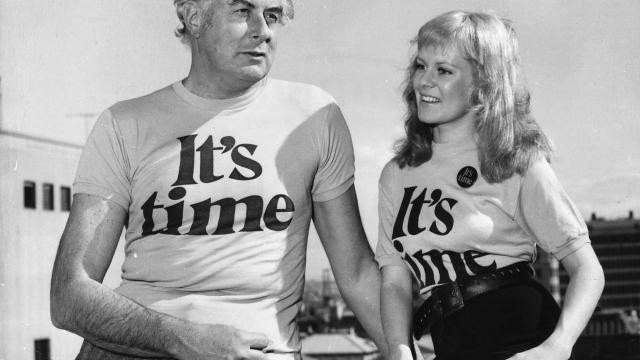“Do you want to see Gough Whitlam’s FBI file?” I said, walking into the other room where my wife was reading.
“Yes!” she said excitedly. My wife’s Australian, and she knows I’ve been obsessed with figuring out what the FBI and CIA knew about former Australian Prime Minister Gough Whitlam’s bizarre ouster as leader of the country in 1975. Whitlam’s FBI file could hold clues to a mystery that’s still as confounding today as it was 40 years ago.
Future Australian Prime Minister and singer Little Pattie campaigning for the Australian Labour Party in 1972 (Getty)
When I walked into the room, holding eight flimsy pages that had just come in the mail, my wife laughed out loud. I get the feeling that the FBI is holding out on us.

Excerpt from Gough Whitlam’s FBI file, released today under a FOIA request from Gizmodo
In November of 1975 the super liberal Whitlam was spontaneously fired as the head of the government by what seemed at the time like a renegade member of his own party, Governor-General John Kerr. The conservative leader Malcolm Fraser was installed as Prime Minister and the Australian people were told in 1975 that the reason for Whitlam’s dismissal was to break a deadlock over budget bills. Constitutionally, Kerr was within his rights to do it. But it had never occurred to anybody that he would.
There were charges of a possible CIA-backed conspiracy from the beginning. And many wondered what the royal family in England knew. Australia was and is, after all, part of the British Commonwealth, and at least marginally beholden to that strange anachronism known as the British monarchy.
It has since come out in recent years that the royals almost certainly were warned ahead of time that the dismissal was going to happen, though there’s scant evidence that they directed the overthrow of Whitlam. This, however, would have to mean that Kerr acted alone in dismissing Whitlam; a strange idea indeed. People who believe that the CIA was involved point to an American defence contractor named Christopher Boyce who was spying for the Soviet Union at the time. He testified that he heard CIA agents refer to John Kerr, the man who dismissed Whitlam, as “our man Kerr”.
Why would the American government want to overthrow the left-leaning government of Australia in the mid-’70s? The Whitlam government was the most liberal of the modern age. And perhaps most threatening to the Americans, Whitlam wasn’t too keen on the American military bases in Australia. They were effectively being run as sovereign American entities on Australian soil. When a Whitlam aide went knocking on the door of Pine Gap, the NSA spy facility that kept track of Southeast Asia in the early 1970s, the aide was basically told to go screw himself.
To my mind, there isn’t direct evidence that any arm of the US military or intelligence community helped orchestrate the overthrow of the Australian government in 1975. But it’s entirely possible that they did. And even more plausibly, they probably knew it was going to happen before it did. And if the latter is true, it’s probably time we found out about that. It’s been over 40 years, after all.
The letter I received today from the FBI after filing a Freedom of Information Act request says that the agency reviewed 33 pages on Gough Whitlam and are releasing eight. The pages deal with security for Whitlam’s visits to the United States in the spring of 1974 and May of 1975.
Curiously, even if you forget the controversy surrounding the dismissal, there isn’t a single page covering Whitlam’s visits to the Nixon White House in December of 1972 or July of 1973. The 1973 visit was especially testy because by that time Whitlam was explicitly criticising the Nixon administration’s decisions in the Vietnam War. Australia, it should be noted, was an ally that sent 60,000 troops to Vietnam. They fought and died alongside Americans, unlike other allies of the United States like Canada. Australia began a phased withdrawal of troops from the country in the beginning of 1973.
Below I’ve published all eight pages I received from the FBI. Of the redactions that the agency made for the documents that they did release, they cited privacy and national security concerns. Needless to say, I’ll be appealing the response to my FOIA request and will keep you posted on any more information I receive. I have a variety of FOIA requests into the CIA about the dismissal that are still pending.
